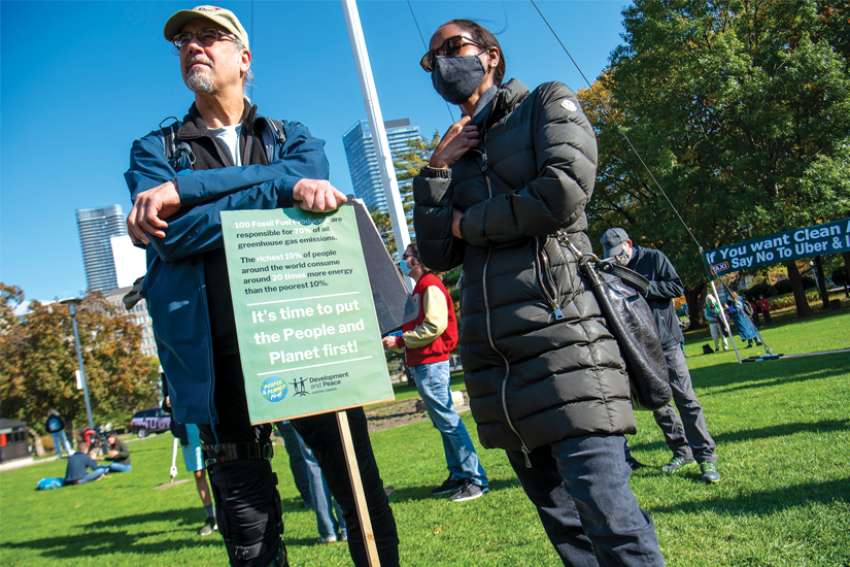“I don’t call this protesting,” said Archdiocese of Toronto Development and Peace council chair Estela Rios. “I call this bearing witness. We’re bearing witness that there is a problem.”
“Climate change is catastrophic and urgent and requires a diverse set of voices to protest, including Christian voices,” said Development and Peace member Jude Claude.
Claude and her friend Tapji Garba held a sign with a quote from Pope Francis’ encyclical Fratelli Tutti. “We need to think of ourselves more and more as a single family dwelling in a common home,” it read in part.
The Toronto gathering was modest compared to as many as 100,000 protesters in Glasgow and 10,000 to 20,000 in London, but in line with crowds in the hundreds in Montreal, Vancouver and other Canadian cities. It came as national political leaders exited Glasgow, leaving senior bureaucrats in charge of further, technical negotiations.
This is the 26th Conference of the Parties to co-ordinate a global response to climate change, known as COP26. Pope Francis sent Vatican secretary of state Cardinal Pietro Parolin to represent the Holy See. In a message read by Parolin, Francis said the world is facing a crisis akin to a world war.
The message from Development and Peace to fellow parishioners is that global warming is not some exotic, side issue, said Development and Peace central Ontario animator Dean Dettloff.
“There’s a lot of work to do in telling Catholics that ecology is a central issue,” he said.
Anglican priest Maggie Helwig concurs.
“Our faith obliges us to be good stewards of creation,” she said.
Going into the Global Day of Action, more than 100 countries had pledged to cut global methane emissions by 30 per cent or more between now and 2030. A United Kingdom-led effort to “consign coal to history” signed up 77 countries promising to “end all investment in new coal power generation domestically and internationally,” then phase out coal-fired electricity by the 2030s in major economies or the 2040s in developing countries. But the coal pledge leaves out China, India, the United States and Australia.
The International Energy Agency, which monitors national carbon pledges, reported that if all pledges are met the world could limit global heating to 1.8 degrees. It’s the first time scientists have seen the possibility of warming less than two degrees, but activists worry that the “if all pledges are met” clause represents a very big if.
Former Bank of Canada governor Mark Carney presented the Glasgow Financial Alliance for Net Zero, which brings together banks, insurance companies and pension funds pledging to direct investment away from fossil fuels. Carney said the investment shift could amount to $100 trillion over the next three decades.
Canada said it would, over the next five years, take at least 20 per cent of its $5.3-billion international climate finance commitment out of the bank and put it in the hands of poor countries adapting to climate change. Canada was also all in on a pledge by 100 countries to end deforestation by 2030.


